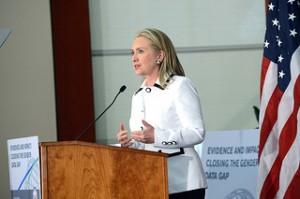 “Data not only measures progress; it inspires it.” And, indeed, Hillary Rodham Clinton’s nerdy view of innovation did excite those sitting around me recently at Evidence and impact: closing the gender data gap.
“Data not only measures progress; it inspires it.” And, indeed, Hillary Rodham Clinton’s nerdy view of innovation did excite those sitting around me recently at Evidence and impact: closing the gender data gap.
Clinton’s speech was both an analysis of the need for better data about women and their lives as well as a challenge to researchers and university leaders.
“Data only becomes valuable when it is organized and put to work. And before we make big decisions — in business, in government, in life — we should do the research, run the numbers. It’s how we minimize risk and maximize impact.” What decisions is Clinton referring to here? How can we help her?
She illustrates her hopes by delivering what sounds like a wish list for future PhD dissertations:
- 2.3 billion people have access to the internet. We don’t know how many of them are women. That means researchers can’t study how women in developing countries use the internet to educate themselves, to start or run a business, or to find the information they need to tend to the health and well-being of their families.
- Eliminating barriers to women’s participation in certain industries or levels of management could increase the productivity of all workers. But there are surely vastly different barriers in different countries. What are the barriers in Indonesia and how are they different from the barriers in Nigeria? More gender-sensitive data and analysis could tell us.
- If women farmers had access to the same seeds, equipment, and irrigation as men farmers, they could increase their crop yields 20 to 30 percent and feed up to an additional 150 million hungry people. Yet we lack critical information on women’s land use, property rights, and access to seeds and fertilizer.
- We know how many women sit in national parliaments, but not local and regional bodies. Women leaders are more likely to direct spending toward infrastructure like better drinking water and sanitation. We need to learn more about how greater representation by women influences public spending and public choices.
When we lack the data to build new policies around these important questions, we are, Clinton says “leaving much-needed value on the table.” She is quick to emphasize that a focus on women benefits everyone. When inequality is reduced, the standard of living for everyone is increased, as extensively documented at The Equality Trust.
Hillary Clinton does express confidence in researchers and their work to generate new knowledge. But she also gives us at least two challenges.
The first challenge implicit in her message is for us to see inequality where it exists in our own organizations, to fix it, and to illustrate that enhanced gender equality makes universities better for everyone.
The second challenge is to contribute to closing the gender data gap. How can those of us in university leadership positions facilitate that?
At an overarching level, we must remember that our own work to enhance gender equality in our institutions is not only a human resources project focused on improving the quality of the workplace, giving equal opportunities to women, and replacing discriminatory structures with fairer ones.
Gender equality work is also about teaching and research. In those domains, we must highlight Clintonian gender data gaps to give our students and researchers an enhanced understanding about the need for better data.
An amplified appreciation of the need for data can more easily be turned into action if we convince ourselves that including data about sex and gender in research actually augments the quality of science. In one field after the next, good examples are emerging where we see that gendered perspectives lead to higher quality results. Several case studies of this type are presented at the Gendered Innovations website.
Scientific journals have also begun to see the connection between gender data and quality. In fact, several have started requiring that submitted papers include information about the sex of the subjects in experiments.
Hillary Clinton wants to make policy decisions based on knowledge. In cases where the knowledge isn’t available, she wants researchers to do the hard work necessary to make the relevant discoveries. When we do, the gap will shrink and we’ll create the circumstances for more informed political actions and evidence-based improvements in quality of life for everyone.
Secretary Clinton’s speech is publicly available, both as text and video.
Share
No Comments
Republish
I encourage you to republish this article online and in print, under the following conditions.
- You have to credit the author.
- If you’re republishing online, you must use our page view counter and link to its appearance here (included in the bottom of the HTML code), and include links from the story. In short, this means you should grab the html code below the post and use all of it.
- Unless otherwise noted, all my pieces here have a Creative Commons Attribution licence -- CC BY 4.0 -- and you must follow the (extremely minimal) conditions of that license.
- Keeping all this in mind, please take this work and spread it wherever it suits you to do so!

Discuss